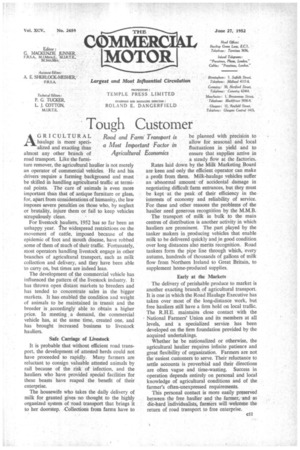Tough Customer
Page 49

If you've noticed an error in this article please click here to report it so we can fix it.
Road and Farm Transport is a Most Important Factor in Agricultural Economics
AGRICULTURAL haulage is more specialized and exacting than almost any other branch of road transport. Like the furniture remover, the agricultural haulier is not merely an operator of commercial vehicles. He and his drivers `require a farming background and must be skilled in handling agricultural traffic at terminal points. The care of animals is even more important than that of antique furniture or glass; for, apart from considerations of humanity, the law imposes severe penalties on those who, by neglect or brutality, injure them or fail to keep vehicles scrupulously clean.
For livestock hauliers, 1952 has so far been an unhappy year. the widespread restrictions on the movement of cattle, imposed because of the epidemic of foot and mouth disease, have robbed , some of them of much of their traffic. Fortunately, most operators handling livestock engage in other branches of agricultural transport, such as milk collection and delivery, and they have been able to carry on, but times are indeed lean.
The development of the commercial vehicle has influenced the pattern of the livestock industry. It has thrown open distant markets to breeders and has tended to concentrate sales in the bigger markets. It has enabled the condition and weight of animals to be maintained in transit and the breeder is ,accordingly able to obtain a higher price. In meeting , a demand, the commercial vehicle has, at the same time, created one, and has brought increased business to livestock hauliers.
Safe Carriage of Livestock It is probable that without efficient road transport, the development of attested herds could not have proceeded so rapidly. Many farmers are reluctant to consign valuable attested animals by rail because of the risk of infection, and the hauliers who have provided special facilities `for these beasts have reaped the benefit of their enterprise.
The housewife who takes the daily delivery of milk for granted gives no thought to the highly organized system of road transport that brings it to her doorstep. Collections from farms have to be planned with precision to allow for seasonal and local fluctuations in yield and to ensure that supplies arrive in a steady flow at the factories.
Rates laid down by the Milk Marketing Board are keen and -only the efficient operator can make a profit from them. Milk-haulage vehicles suffer an -abnormal amount of accidental damage in negotiating difficult farm entrances, but they must be kept at the peak of their efficiency in the interests of economy and reliability of service. For these and other reasons the problems of. the haulier need generous recognition by the M.M.B.
The transport of milk in bulk to the main centres of distribution is another activity in which hauliers are prominent. The part played by the tanker makers in ,producing vehicles that enable milk to be delivered quickly and in good condition over long distances alai merits recognition. Road tankers form the pipe line through which, every autumn, hundreds of thousands of gallons of milk flow from Northern Ireland to Great Britain, to supplement home-produced supplies.
Early at the Markets The delivery of perishable produce to market is another exacting branch of agricultural transport. It is one in which the Road Haulage Executive has taken over most of the long-distance work, but free hauliers still have a firm hold on local traffic. The R.H.E. maintains close contact with the National Farmers' Union and its members at all levels, and a specialized service has been developed on the firm foundation provided by the acquired undertakings.
Whether he be nationalized or otherwise, the agricultural haulier requires infinite patience and great flexibility of organization. Farmers are not the'easiest customers to serve. Their reluctance to settle accounts is proverbial and their directions are often vague and time-wasting. Success in operation depends entirely on personal and local knowledge of agricultural conditions and of the farmer's often-unexpressed requirements.
This personal contact is more easily preserved between the free haulier and the farmer, and as die-hard individualists, farmers will welcome the return of road transport to free enterprise.
















































































































































